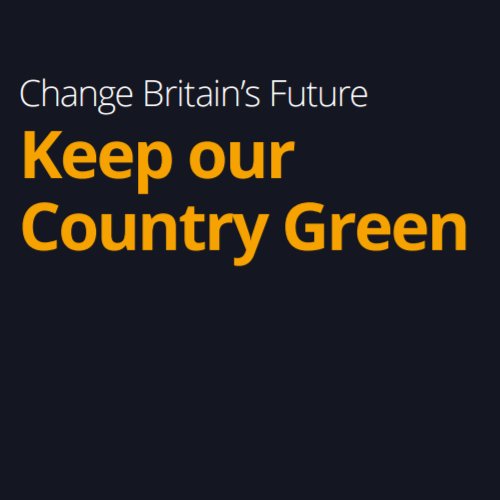Keep our Country Green is part of the Liberal Democrats Parties 2017 General Election Manifesto.
Liberal Democrats Manifesto 2017 PDF Format

Lib Dems Manifesto 2017 – Keep our Country Green
Liberal Democrats Manifesto 2017 – Keep our Country Green
Eighteen months ago, it seemed that the world had come to a consensus on the need to take the perils of climate change seriously. Countries across the globe had recognised that rising temperatures and pollution were not just an environmental issue, but an economic and security issue. But with the election of Donald Trump in the US and Britain’s vote to leave the EU, the tides of isolationism and populism could halt or even reverse the progress that has been made.
The Conservatives seem determined to take Britain back to the 1980s, when the UK was the ‘dirty man of Europe’. They have cut support for renewable energy and home insulation, sold off the Green Investment Bank and failed to control air pollution. Their actions put not just Britain’s environment at risk but the health of its citizens and its economy, undermining the increasingly successful green industries which already employ more than half a million workers.
Liberal Democrats are determined that we live up to our environmental obligations. That’s why we will pass five green laws: a Green Transport Act, a Zero-Carbon Britain Act, a Nature Act, a Green Buildings Act, and a Zero-Waste Act to incorporate existing EU environmental protections, maintain product standards such as for energy efficiency, and establish a framework for continual improvement.
Our priorities in the next parliament will be:
5.1 Clean air and green transport
Air pollution in the UK is a killer. It contributes to 40,000 premature deaths a year and costs the NHS £15 billion. This year, London exceeded its annual air pollution target in just five days. The government has failed time and again to comply with EU limits on pollution.
That’s why the Liberal Democrats will pass a Green Transport Act, introduce an Air Quality Plan to reduce air pollution and protect UK citizens, and support the manufacture of low-emission and electric vehicles, generating jobs and exports.
This plan will include:
- A diesel scrappage scheme, and a ban on the sale of diesel cars and small vans in the UK by 2025.
- Extending ultra-low-emission zones to 10 more towns and cities.
- All private hire vehicles and diesel buses licensed to operate in urban areas to run on ultra-low-emission or zero-emission fuels within five years.
We will also reform vehicle taxation to encourage sales of electric and low-emission vehicles and develop electric vehicle infrastructure including universal charging points.
5.2 Low-carbon energy and green jobs
In government, we championed green energy, and oversaw the trebling of renewable electricity generation. But the Conservatives have repeatedly cut support for green energy producers – damaging the environment and costing British jobs.
Liberal Democrats will expand renewable energy, reducing carbon emissions, cutting dependence on fossil fuel imports and generating more jobs and prosperity. We will:
- Pass a Zero-Carbon Britain Act to set new legally binding targets to reduce net greenhouse gas emissions by 80% by 2040 and to zero by 2050.
- Set up a British Housing and Infrastructure Development Bank to mobilise investment into the low-carbon and sustainable infrastructure the UK needs to remain competitive.
- Support the Paris agreement by ensuring the UK meets its own climate commitments and plays a leadership role in international efforts to combat climate change.
- Expand renewable energy, aiming to generate 60% of electricity from renewables by 2030, restoring government support for solar PV and onshore wind in appropriate locations (helping meet climate targets at least cost) and building more electricity interconnectors to underpin this higher reliance on renewables.
- Support investment in cutting-edge technologies including energy storage, smart grid technology, hydrogen technologies, offshore wind, and tidal power (including giving the go-ahead for the Swansea Bay tidal lagoon), and investing heavily in research and development.
- Support an ambitious carbon capture and storage programme, which is essential for delivering clean industrial growth.
- Oppose ‘fracking’ because of its adverse impact on climate change, the energy mix, and the local environment.
- Accept that new nuclear power stations can play a role in electricity supply provided concerns about safety, disposal of waste and cost are adequately addressed, new technology is incorporated, and there is no public subsidy for new build.
- Maintain membership of Euratom, ensuring continued nuclear co-operation, research funding, and access to nuclear fuels.
5.3 Greener homes, lower energy bills
At more than £1,200 a year, the cost of heating and lighting an average home in the UK is too high – and with a falling exchange rate, costs will rise further. More than two million families – one in 10 households in England – cannot afford to heat their home properly.
Liberal Democrats will reduce energy bills permanently by improving home insulation and encouraging small-scale, community and local-authority renewable schemes. We will make saving energy a top infrastructure priority, slashing energy bills and carbon emissions, creating thousands of jobs and helping end the fuel poverty crisis once and for all. We will:
- Pass a new Green Buildings Act to set new energy-efficiency targets, including a long-term ambition for every home in England to reach at least an energy rating of Band C by 2035.
- Ensure that at least four million homes are made highly energy efficient (Band C) by 2022, with priority given to fuel-poor households.
- Restore the zero-carbon standard for new homes which was set by Liberal Democrats in government and since abandoned by the Conservatives, increasing the standard steadily and extending it to non-domestic buildings by 2022.
- Expand community energy schemes, encourage councils to develop community energy-saving projects and local electricity generation, and promote city-scale demonstration projects in electric vehicles and clean energy.
- Continue to back new entrants to the energy market, aiming for at least 30% of the household market to be supplied by competitors to the ‘Big 6’ by 2022.
5.4 Protecting nature
Britain’s natural environment is precious. The countryside, wildlife and urban green spaces are critical to health, wellbeing and a sense of community. The quality of the environment also underpins key industries such as agriculture and tourism. We will:
- Establish a £2 billion flood-prevention fund focused on providing support for small community and council-led schemes to reduce upstream flooding, and the knock-on effects in downstream and coastal areas, in addition to improving flood defences, and introducing high standards for flood resilience for buildings and infrastructure in flood-risk areas.
- Pass a Nature Act to put the Natural Capital Committee (NCC) on a statutory footing, set legally binding natural capital targets, including on biodiversity, clean air and water, and empower the NCC to recommend actions to meet these targets.
- Significantly increase the amount of accessible green space, including completion of the coastal path, and create a new designation of national nature parks to protect up to one million acres of accessible green space valued by local communities.
- Protect and restore England’s lakes, rivers and wetlands, including through reform of water management and higher water-efficiency standards, and establish a ‘blue belt’ of protected marine areas.
- Reverse the current sharp decline in the rate of woodland creation by aiming to plant a tree for every UK citizen over the next 10 years, and protect remaining ancient woodlands.
- Suspend the use of neonicotinoids until proven that their use in agriculture does not harm bees or other pollinators.
- Introduce stronger penalties for animal cruelty offences, increasing the maximum sentencing from six months to five years, and bring in a ban on caged hens.
- Clamp down on illegal pet imports through legal identification requirements for online sales, and minimise the use of animals in scientific experimentation, including by funding research into alternatives.
5.5 Farming, food and agriculture
The vote to leave the EU puts farming and agricultural businesses in huge danger, threatening both cuts to the support which underpin farmers’ livelihoods and ability to manage the countryside, and also tariffs on exports. For agricultural products outside the EU, tariffs average 22.3% – putting Britain’s £18 billion of food exports in danger.
Our system must support farmers, ensure food production and protect the environment. That’s why we will:
- Continue our long campaign to reform agricultural subsidies – making sure British farming remains competitive and doesn’t lose out in the event of Britain leaving the EU, rebalancing away from direct subsidy and refocusing support towards the public benefits that come from effective land management including countryside protection, flood prevention, food production and climate-change mitigation. This would ensure that smaller farms are protected and move support away from large landowners, while delivering a more localised agricultural policy.
- Encourage new and younger entrants to farming by championing different forms of ownership including longer tenancies, share farming and community ownership.
- Introduce a national food strategy to promote the production and consumption of healthy, sustainable and affordable food.
- Increase the powers of the Groceries Code Adjudicator and extend its remit to include businesses further up the supply chain, helping to ensure that farmers receive a fair price.
- Continue to improve standards of animal health and welfare in agriculture by updating farm animal welfare codes and promoting the responsible stewardship of antibiotic drugs.
- Ensure that future trade deals require high safety, environmental and animal welfare standards for food imports, including clear and unambiguous country-of-origin labelling for meat and dairy products.
- Develop safe, effective, humane and evidence-based ways of controlling bovine TB, including by investing to produce workable vaccines.
Despite reform, the Common Fisheries Policy has failed to deliver the economic or environmental objectives necessary and has suffered from being remote, overly centralised and bureaucratic. Hard Brexit and the loss of export markets threatens to further damage the industry, which has long suffered from being used as a bargaining chip by UK governments. Liberal Democrats would defend and maintain our fishing industry by not allowing fishing rights to be traded away against other policy areas, and work with the industry and other stakeholders to develop a national plan for sustainable fisheries.
5.6 Cutting waste, using resources wisely
Britain’s economy fails to make the most efficient use of natural resources. We aim to cut waste, increase recovery, reuse and recycling and move towards the so-called ‘circular economy’ in which resource use, waste and pollution are minimised and product lifetimes are extended. This will cut costs for consumers and businesses, and create new jobs and enterprises, helping to grow Britain’s economy. We will:
- Pass a Zero-Waste Act, including legally binding targets for reducing net consumption of key natural resources, and introducing incentives for businesses to improve resource efficiency.
- Benefit consumers by promoting better product design to improve repairability, reuse and recycling.
- Establish a statutory waste recycling target of 70% in England and extend separate food waste collections to at least 90% of homes by 2022.
- Building on the success of our plastic bag charge, introduce a 5p charge on disposable coffee cups to reduce waste.
- Establish a coherent tax and regulatory framework for landfill, incineration and waste collection, including reinstating the landfill tax escalator and extending it to the lower rate, and consulting on the introduction of an incineration tax.
- Work with local government to ensure these commitments are fully funded.
To ensure the policies set out in this chapter are implemented, and to put the protection of the environment at the heart of policies across all areas of government, we will establish a Cabinet Committee on Sustainability, chaired by a cabinet minister, establish an Office for Environmental Responsibility to scrutinise the government’s efforts to meet its environmental targets, and place a responsibility on every government agency to account for its contribution towards meeting climate targets in everything it does.
Liberal Democrats Parties 2017 General Election Manifesto
Liberal Democrats Manifesto 2017 – Introduction
Liberal Democrats Manifesto 2017 – Protect Britain’s Place in Europe
Liberal Democrats Manifesto 2017 – Save our NHS and Social Care Services
Liberal Democrats Manifesto 2017 – Put Children First
Liberal Democrats Manifesto 2017 – Build an Economy that Works for You
Liberal Democrats Manifesto 2017 – Keep our Country Green
Liberal Democrats Manifesto 2017 – Support Families and Communities
Liberal Democrats Manifesto 2017 – Defend Rights, Promote Justice and Equalities
Liberal Democrats Manifesto 2017 – Make a Better World
Liberal Democrats Manifesto 2017 – Fix a Broken System















